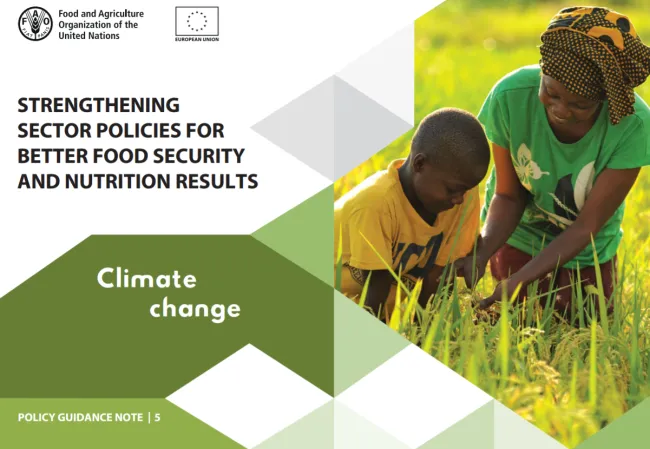The purpose of this policy guidance note is to guide policy makers at country level to identify entry points for assessing and addressing food security and nutrition (FSN) in the face of climate change. It includes background information on how climate change and variability affect the agriculture sectors and FSN and how the agriculture sectors and dietary patterns contribute to GHG emissions.

This note also provides guidance on how to pursue adaptation-mitigation synergies in the agriculture sectors and on how to assess and design conducive policies that are coherent across sectors and domains and build upon international policy instruments under the UNFCCC. International and domestic climate finance options are also described.
This policy guidance note is part of a series that the Food and Agriculture Organization of the United Nations (FAO), the Directorate for International Cooperation and Development (DEVCO) of the European Commission and partners are producing to support policy-makers address the food security and nutrition situation in their country. Each note provides guidance on how to sharpen the focus of sector policies in order to achieve sustainable food security and nutrition outcomes.
The report’s key messages are:
- The agriculture sectors are simultaneously contributors to climate change and vulnerable to it, and they offer unique synergies between adaptation and mitigation action.
- Climate change poses many risks for ecosystems and agro-ecosystems, food systems, incomes and trade, livelihoods, and all four dimensions of food security. Extreme events are increasing in frequency and intensity, threatening the agriculture sectors and the livelihoods they support. In developing countries, they are severely affecting the livelihoods and FSN of vulnerable households and communities because of their lower adaptive capacities. Beyond 2030, the impacts of climate change on the productive capacity of the agriculture sectors and thus FSN will become increasingly severe in all regions.
- Climate change and extreme events are two among other factors, others of which include urbanisation, global population growth and environmental pollution, that are asserting pressure on the agriculture sectors and FSN.
- Food producers and processors along the supply chain face numerous barriers that prevent them from adopting practices and technologies to help them upscale their adaptive and productive capacity and their mitigation contributions.
- Conducive policy frameworks that are coherent across sectors are needed to provide incentives and support to overcome these barriers. Climate change policies, activities and investments are strongest when built upon an analysis of adaptation–mitigation synergies and trade-offs, as well as co-benefits such as ecosystem health, human development and income/job creation.
- Disaster risk reduction (DRR) plans should be mainstreamed into these policy frameworks.
- Increased public and private investment in sustainable systems and supply chains is crucial. Public investment is needed inter alia to adapt or enhance infrastructure, research and extension, climate information, financial services and market access in view of a changing climate. Service provision for primary health care, water and sanitation are key for supporting food security and nutrition in the face of climate change.
Read the full note here.




Comments (0)